农学专业英语论文(张晓星)
- 格式:doc
- 大小:43.00 KB
- 文档页数:6
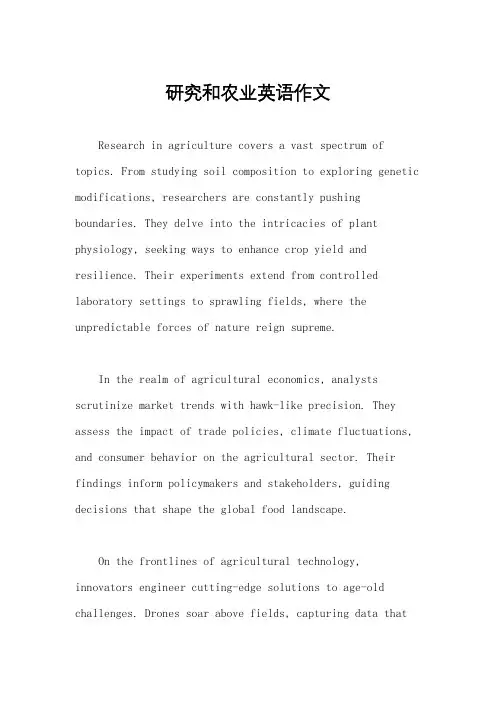
研究和农业英语作文Research in agriculture covers a vast spectrum of topics. From studying soil composition to exploring genetic modifications, researchers are constantly pushing boundaries. They delve into the intricacies of plant physiology, seeking ways to enhance crop yield and resilience. Their experiments extend from controlled laboratory settings to sprawling fields, where the unpredictable forces of nature reign supreme.In the realm of agricultural economics, analysts scrutinize market trends with hawk-like precision. They assess the impact of trade policies, climate fluctuations, and consumer behavior on the agricultural sector. Their findings inform policymakers and stakeholders, guiding decisions that shape the global food landscape.On the frontlines of agricultural technology, innovators engineer cutting-edge solutions to age-old challenges. Drones soar above fields, capturing data thatunveils hidden patterns and anomalies. Robots equipped with advanced sensors meticulously tend to crops, optimizing resource usage while minimizing environmental impact.In the domain of sustainable agriculture, advocates champion practices that harmonize productivity with ecological stewardship. They promote agroforestry systems that mimic natural ecosystems, fostering biodiversity and soil health. Through agroecological approaches, farmers cultivate resilience in the face of climate uncertainty, safeguarding food security for generations to come.In the field of agricultural education, educators nurture the next generation of agrarian leaders. They impart practical skills alongside theoretical knowledge, bridging the gap between academia and real-world application. Through experiential learning opportunities, they cultivate a deep-rooted passion for agriculture, inspiring future trailblazers to tackle pressing agricultural challenges head-on.In the sphere of agricultural policy, lawmakersnavigate a complex web of competing interests and ideologies. They strive to strike a delicate balance between fostering innovation, ensuring food accessibility, and safeguarding environmental integrity. Their decisions reverberate across diverse landscapes, shaping the trajectory of agricultural development on both local and global scales.Amidst these diverse pursuits, the overarching goal remains constant: to foster a thriving agricultural ecosystem that nourishes both people and planet. Through collaboration, innovation, and a steadfast commitment to sustainability, researchers, policymakers, and practitioners continue to chart a course towards a more resilient and equitable food future.。
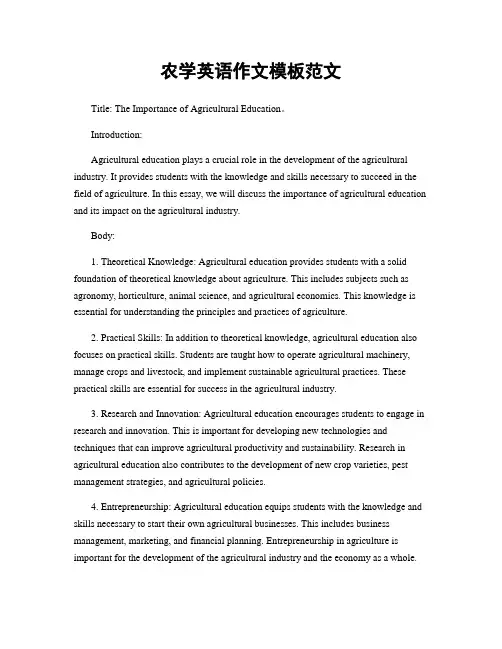
农学英语作文模板范文Title: The Importance of Agricultural Education。
Introduction:Agricultural education plays a crucial role in the development of the agricultural industry. It provides students with the knowledge and skills necessary to succeed in the field of agriculture. In this essay, we will discuss the importance of agricultural education and its impact on the agricultural industry.Body:1. Theoretical Knowledge: Agricultural education provides students with a solid foundation of theoretical knowledge about agriculture. This includes subjects such as agronomy, horticulture, animal science, and agricultural economics. This knowledge is essential for understanding the principles and practices of agriculture.2. Practical Skills: In addition to theoretical knowledge, agricultural education also focuses on practical skills. Students are taught how to operate agricultural machinery, manage crops and livestock, and implement sustainable agricultural practices. These practical skills are essential for success in the agricultural industry.3. Research and Innovation: Agricultural education encourages students to engage in research and innovation. This is important for developing new technologies and techniques that can improve agricultural productivity and sustainability. Research in agricultural education also contributes to the development of new crop varieties, pest management strategies, and agricultural policies.4. Entrepreneurship: Agricultural education equips students with the knowledge and skills necessary to start their own agricultural businesses. This includes business management, marketing, and financial planning. Entrepreneurship in agriculture is important for the development of the agricultural industry and the economy as a whole.5. Sustainability: Agricultural education emphasizes the importance of sustainable agricultural practices. Students learn about the impact of agriculture on the environment and the importance of conserving natural resources. This knowledge is essential for ensuring the long-term sustainability of the agricultural industry.Conclusion:In conclusion, agricultural education is essential for the development of the agricultural industry. It provides students with the knowledge and skills necessary to succeed in agriculture, encourages research and innovation, promotes entrepreneurship, and emphasizes the importance of sustainability. By investing in agricultural education, we can ensure a bright future for the agricultural industry and the global food supply.。

农业专业英语教学中的问题与对策改革开放以来,中国在农业方面的发展经历了前所未有的变革,实现了从传统的手工业生产到现代化的机器加工生产的过渡。
这一变革加快了中国与世界各国在农业领域中的交流与合作,各国通过频繁的贸易往来、技术交流、投资引入等方式不断提升农产品的产出数量和质量,促进了全球经济的持续高效发展。
在与国外对接过程中,国家旨在培养出符合国际化要求的专业化人才,这就要求相关人才必须具备农业专业英语方面的基本词汇、短语、句型以及最为重要的口语方面的技能,这样不仅可以提升专业人员在农业领域的基本素质,而且可以提升我国的综合国力,增强我国在国际上的竞争力。
目前,很多高等院校都开设了《专业英语》这门课程,其目的是让学生掌握与专业相关的英语知识,提高阅读国外与专业有关的资料和文献的能力,具备撰写专业英语论文的能力和用专业英语交流的能力。
但在实际教学中,仍存在许多的问题亟待解决。
《农业专业英语》一书是夏家驷教授融合自身多年的从教经验,根据当前我国农业专业英语教学的缺失进行编著的,目的是提高高等农业院校学生的专业英语水平,增强其专业英语综合能力,培养符合社会主义现代化建设要求的新型学生队伍。
该书内容丰富,题材新颖,紧跟当前的国际形势,涵盖了国外先进的农业科学发展技术,难度适中,又配以录音资料,重视对学生听说读写能力的培养。
全书共分为十二个单元,内容包括农业、动物科学、食品、转基因技术、环境保护、水资源利用、渔业、园艺、林学、农业机械化、昆虫、农业经济等方面,不但可以帮助学生解决学习专业英语方面存在的问题,锻炼英语口语和阅读能力,提高分析问题和解决问题的能力,而且可以拓展农业专业学生的眼界,有助于他们学习国外先进的农业技术手段,从而保证我国农业科学技术的不断创新和发展。
根据对《农业专业英语》的阅读,读者可以清晰了解到农业专业英语这本书的突出特点,进而知晓其对高等院校学生学习的重要价值。
就其特点而言,首先,这本教材贴近现实,实用性强。
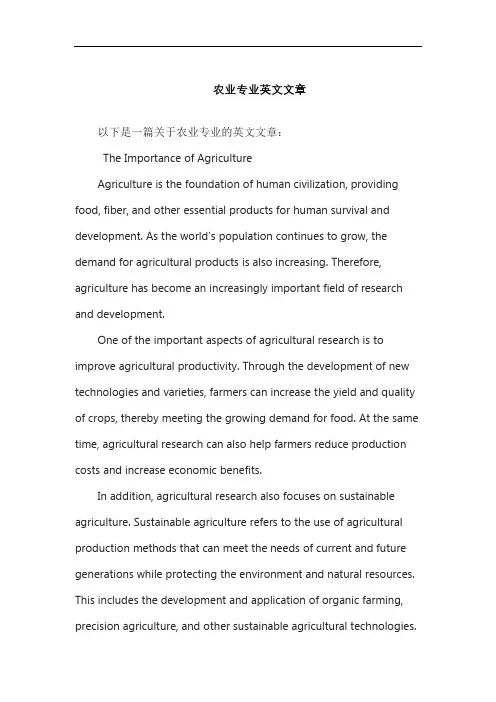
农业专业英文文章以下是一篇关于农业专业的英文文章:The Importance of AgricultureAgriculture is the foundation of human civilization, providing food, fiber, and other essential products for human survival and development. As the world's population continues to grow, the demand for agricultural products is also increasing. Therefore, agriculture has become an increasingly important field of research and development.One of the important aspects of agricultural research is to improve agricultural productivity. Through the development of new technologies and varieties, farmers can increase the yield and quality of crops, thereby meeting the growing demand for food. At the same time, agricultural research can also help farmers reduce production costs and increase economic benefits.In addition, agricultural research also focuses on sustainable agriculture. Sustainable agriculture refers to the use of agricultural production methods that can meet the needs of current and future generations while protecting the environment and natural resources. This includes the development and application of organic farming, precision agriculture, and other sustainable agricultural technologies.Furthermore, agricultural research also involves the study of agricultural policies and markets. By analyzing agricultural policies and market trends, researchers can provide policymakers and farmers with valuable information and advice to help them make informed decisions.In conclusion, agriculture is an extremely important field that plays a crucial role in human survival and development. Through continuous research and innovation, we can improve agricultural productivity, promote sustainable agriculture, and ensure global food security.。
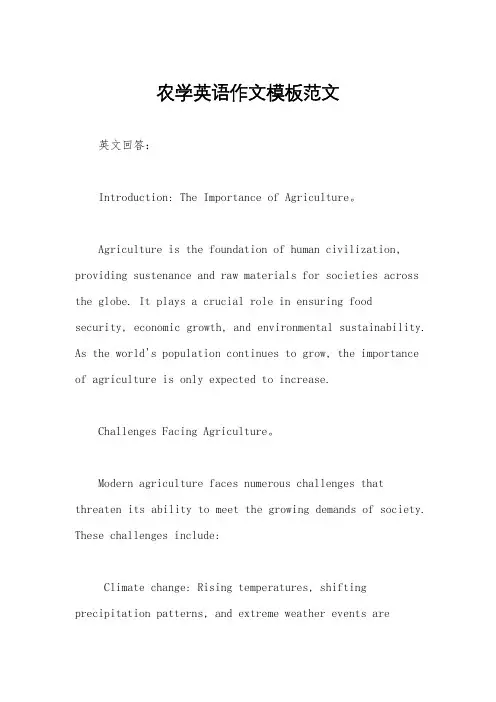
农学英语作文模板范文英文回答:Introduction: The Importance of Agriculture。
Agriculture is the foundation of human civilization, providing sustenance and raw materials for societies across the globe. It plays a crucial role in ensuring food security, economic growth, and environmental sustainability. As the world's population continues to grow, the importance of agriculture is only expected to increase.Challenges Facing Agriculture。
Modern agriculture faces numerous challenges that threaten its ability to meet the growing demands of society. These challenges include:Climate change: Rising temperatures, shifting precipitation patterns, and extreme weather events areimpacting crop yields and livestock production.Population growth: The world's population is projected to reach 10 billion by 2050, putting increasing pressure on food production systems.Water scarcity: Water is essential for agriculture, and many regions are facing severe water shortages due to climate change and population growth.Pest and disease outbreaks: Pests and diseases can decimate crops and livestock, leading to significant economic losses.Strategies for Sustainable Agriculture。
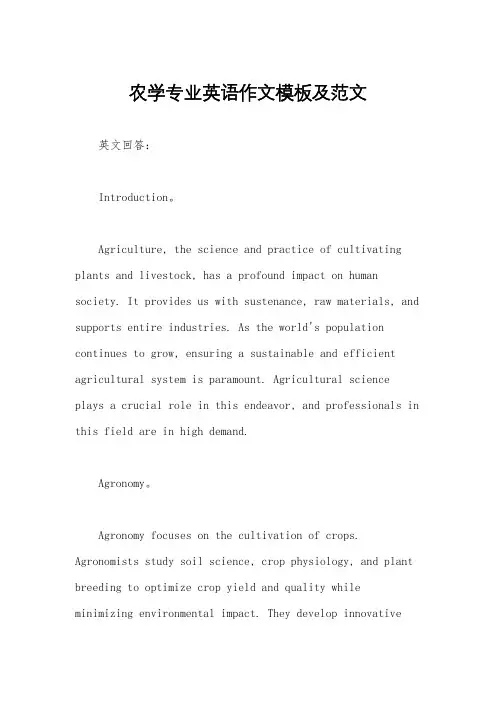
农学专业英语作文模板及范文英文回答:Introduction。
Agriculture, the science and practice of cultivating plants and livestock, has a profound impact on human society. It provides us with sustenance, raw materials, and supports entire industries. As the world's population continues to grow, ensuring a sustainable and efficient agricultural system is paramount. Agricultural science plays a crucial role in this endeavor, and professionals in this field are in high demand.Agronomy。
Agronomy focuses on the cultivation of crops. Agronomists study soil science, crop physiology, and plant breeding to optimize crop yield and quality while minimizing environmental impact. They develop innovativecropping systems, manage pests and diseases, and improve soil health to ensure sustainable agricultural practices.Animal Science。
Animal science revolves around the health, nutrition, and management of livestock. Animal scientists study animal anatomy, nutrition, and genetics to improve animal productivity, welfare, and product quality. They develop feeding strategies, manage breeding programs, and implement disease control measures to ensure the sustainable production of meat, milk, and other animal products.Agricultural Economics。
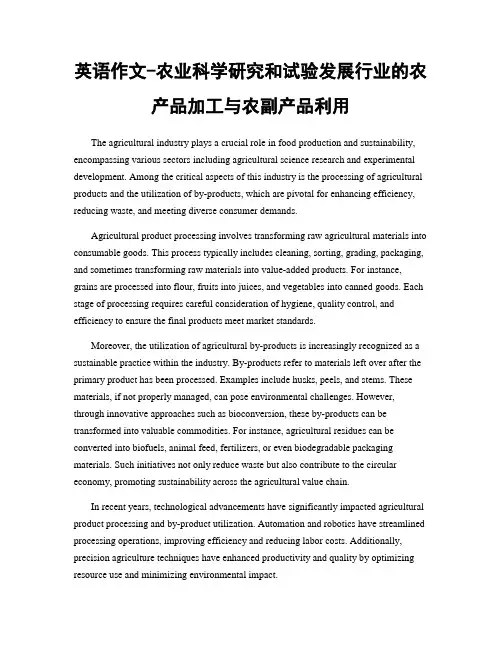
英语作文-农业科学研究和试验发展行业的农产品加工与农副产品利用The agricultural industry plays a crucial role in food production and sustainability, encompassing various sectors including agricultural science research and experimental development. Among the critical aspects of this industry is the processing of agricultural products and the utilization of by-products, which are pivotal for enhancing efficiency, reducing waste, and meeting diverse consumer demands.Agricultural product processing involves transforming raw agricultural materials into consumable goods. This process typically includes cleaning, sorting, grading, packaging, and sometimes transforming raw materials into value-added products. For instance, grains are processed into flour, fruits into juices, and vegetables into canned goods. Each stage of processing requires careful consideration of hygiene, quality control, and efficiency to ensure the final products meet market standards.Moreover, the utilization of agricultural by-products is increasingly recognized as a sustainable practice within the industry. By-products refer to materials left over after the primary product has been processed. Examples include husks, peels, and stems. These materials, if not properly managed, can pose environmental challenges. However, through innovative approaches such as bioconversion, these by-products can be transformed into valuable commodities. For instance, agricultural residues can be converted into biofuels, animal feed, fertilizers, or even biodegradable packaging materials. Such initiatives not only reduce waste but also contribute to the circular economy, promoting sustainability across the agricultural value chain.In recent years, technological advancements have significantly impacted agricultural product processing and by-product utilization. Automation and robotics have streamlined processing operations, improving efficiency and reducing labor costs. Additionally, precision agriculture techniques have enhanced productivity and quality by optimizing resource use and minimizing environmental impact.Research and development (R&D) play a pivotal role in driving innovation within the agricultural processing sector. Scientists and researchers collaborate to develop new processing techniques, improve food safety standards, and explore novel applications for agricultural by-products. For example, genetic engineering has enabled the development of crops with enhanced nutritional profiles or improved resistance to pests and diseases, thereby positively influencing both product quality and yield.Furthermore, international collaboration and knowledge sharing have become increasingly important in advancing agricultural science and technology. Global partnerships facilitate the exchange of expertise, resources, and best practices, accelerating innovation and sustainable development goals in agriculture. Platforms such as conferences, workshops, and joint research projects provide opportunities for stakeholders to collaborate on tackling common challenges and exploring new opportunities in agricultural processing and by-product utilization.In conclusion, the agricultural industry's focus on product processing and by-product utilization is essential for meeting the growing global demand for food, improving resource efficiency, and promoting sustainability. Through continuous research, technological innovation, and international collaboration, the industry can address current challenges and seize opportunities for future growth and development. By optimizing processes and harnessing the potential of agricultural by-products, stakeholders can contribute to a more resilient and sustainable agricultural sector, benefiting both present and future generations.。
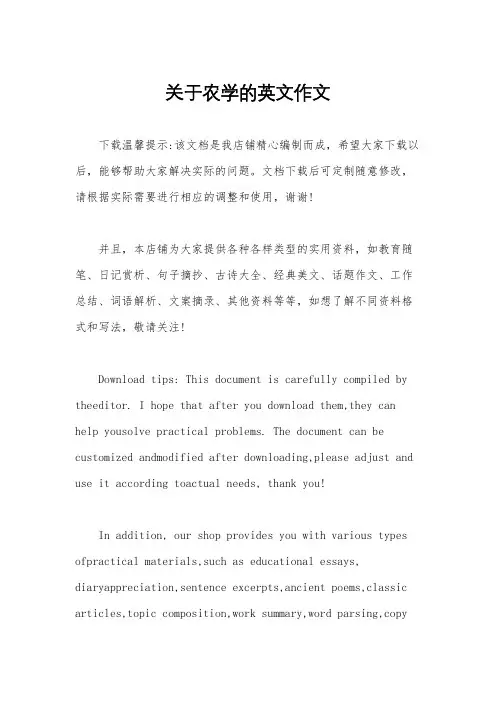
关于农学的英文作文下载温馨提示:该文档是我店铺精心编制而成,希望大家下载以后,能够帮助大家解决实际的问题。
文档下载后可定制随意修改,请根据实际需要进行相应的调整和使用,谢谢!并且,本店铺为大家提供各种各样类型的实用资料,如教育随笔、日记赏析、句子摘抄、古诗大全、经典美文、话题作文、工作总结、词语解析、文案摘录、其他资料等等,如想了解不同资料格式和写法,敬请关注!Download tips: This document is carefully compiled by theeditor. I hope that after you download them,they can help yousolve practical problems. The document can be customized andmodified after downloading,please adjust and use it according toactual needs, thank you!In addition, our shop provides you with various types ofpractical materials,such as educational essays, diaryappreciation,sentence excerpts,ancient poems,classic articles,topic composition,work summary,word parsing,copyexcerpts,other materials and so on,want to know different data formats andwriting methods,please pay attention!I really love agriculture. It's so interesting to see how plants grow and develop.Farmers are amazing. They work hard every day to produce our food.The study of农学 can help us understand nature better. It's like a window into a whole new world.There are so many different aspects of农学, from soil science to crop breeding.We need to pay more attention to agriculture to ensure our future food supply.。
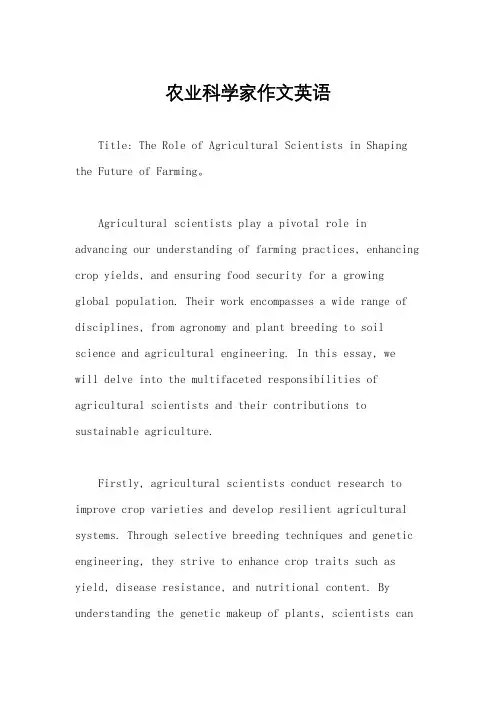
农业科学家作文英语Title: The Role of Agricultural Scientists in Shaping the Future of Farming。
Agricultural scientists play a pivotal role in advancing our understanding of farming practices, enhancing crop yields, and ensuring food security for a growing global population. Their work encompasses a wide range of disciplines, from agronomy and plant breeding to soil science and agricultural engineering. In this essay, wewill delve into the multifaceted responsibilities of agricultural scientists and their contributions to sustainable agriculture.Firstly, agricultural scientists conduct research to improve crop varieties and develop resilient agricultural systems. Through selective breeding techniques and genetic engineering, they strive to enhance crop traits such as yield, disease resistance, and nutritional content. By understanding the genetic makeup of plants, scientists cancreate varieties that are better suited to withstand environmental stresses such as drought, pests, and diseases. Additionally, they explore innovative farming practicessuch as precision agriculture and vertical farming to optimize resource use and minimize environmental impact.Secondly, agricultural scientists play a crucial rolein soil management and conservation. They study soil properties, nutrient cycling, and erosion processes to develop strategies for maintaining soil fertility and preventing degradation. Through soil testing and analysis, scientists provide recommendations for appropriate fertilization practices and soil amendments to optimizecrop productivity while minimizing nutrient runoff and soil erosion. Furthermore, they research alternative cropping systems such as agroforestry and cover cropping to improve soil health and biodiversity.Moreover, agricultural scientists contribute to the sustainable management of water resources in agriculture. They investigate water use efficiency, irrigation technologies, and water quality management to ensure theresponsible use of this precious resource. By developing drought-tolerant crops and efficient irrigation systems, scientists help farmers mitigate the impacts of water scarcity and adapt to changing climatic conditions. Additionally, they promote water conservation practices such as rainwater harvesting and drip irrigation to reduce water waste and improve agricultural sustainability.Furthermore, agricultural scientists address the challenges of pest and disease management in crop production. They conduct research on pest biology, host-pathogen interactions, and integrated pest management strategies to develop effective and environmentally friendly pest control measures. By combining biological, cultural, and chemical control methods, scientists help farmers minimize crop losses and reduce reliance on synthetic pesticides. Furthermore, they monitor pest and disease outbreaks, provide early warning systems, and disseminate information to farmers to facilitate timely intervention and disease prevention.In conclusion, agricultural scientists play a vitalrole in shaping the future of farming by advancing knowledge, developing innovative technologies, and promoting sustainable practices. Their research efforts contribute to increasing crop productivity, improving soil health, conserving water resources, and managing pests and diseases. By collaborating with farmers, policymakers, and other stakeholders, agricultural scientists can help build a resilient and sustainable food system that meets the needs of present and future generations.Overall, the contributions of agricultural scientists are indispensable in addressing the complex challenges facing agriculture and ensuring food security in a rapidly changing world.。
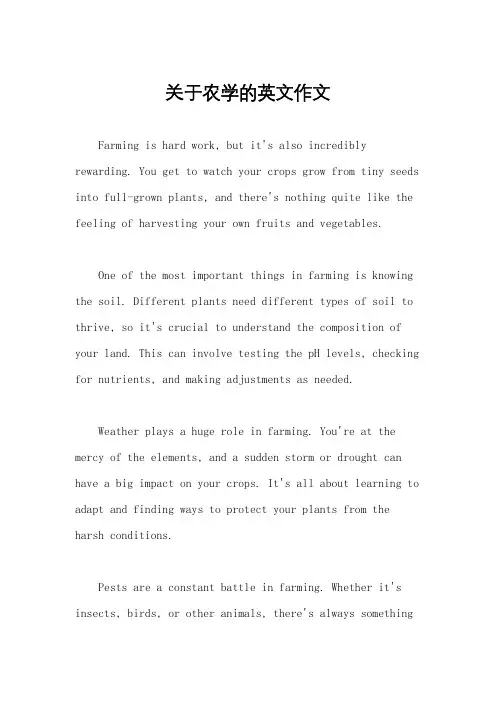
关于农学的英文作文Farming is hard work, but it's also incredibly rewarding. You get to watch your crops grow from tiny seeds into full-grown plants, and there's nothing quite like the feeling of harvesting your own fruits and vegetables.One of the most important things in farming is knowing the soil. Different plants need different types of soil to thrive, so it's crucial to understand the composition of your land. This can involve testing the pH levels, checking for nutrients, and making adjustments as needed.Weather plays a huge role in farming. You're at the mercy of the elements, and a sudden storm or drought can have a big impact on your crops. It's all about learning to adapt and finding ways to protect your plants from the harsh conditions.Pests are a constant battle in farming. Whether it's insects, birds, or other animals, there's always somethingtrying to munch on your crops. Finding natural and sustainable ways to control pests is key, as you don't want to harm the environment or the food you're growing.As a farmer, you have to be constantly learning and adapting. There are always new techniques and technologies to explore, and staying up to date with the latest advancements can make a big difference in the success of your farm.At the end of the day, farming is about more than just growing food. It's about connecting with the land, understanding the cycles of nature, and playing a part in feeding the world. It's hard work, but it's also incredibly fulfilling.。
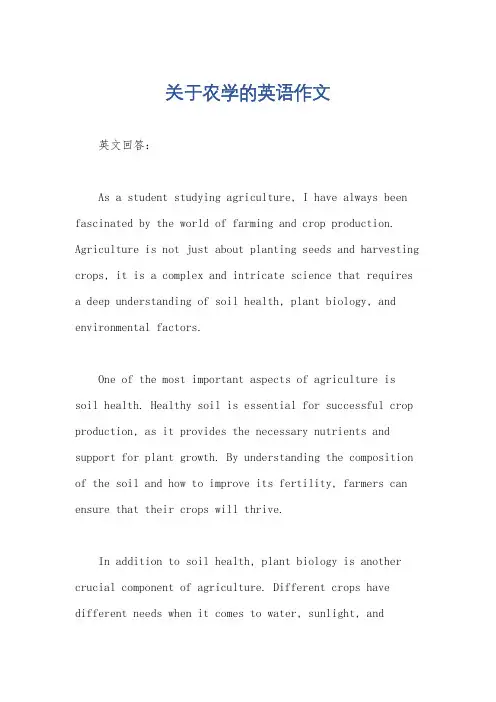
关于农学的英语作文英文回答:As a student studying agriculture, I have always been fascinated by the world of farming and crop production. Agriculture is not just about planting seeds and harvesting crops, it is a complex and intricate science that requires a deep understanding of soil health, plant biology, and environmental factors.One of the most important aspects of agriculture issoil health. Healthy soil is essential for successful crop production, as it provides the necessary nutrients and support for plant growth. By understanding the composition of the soil and how to improve its fertility, farmers can ensure that their crops will thrive.In addition to soil health, plant biology is another crucial component of agriculture. Different crops have different needs when it comes to water, sunlight, andnutrients. For example, corn requires a lot of nitrogen to grow, while tomatoes need a steady supply of water to produce juicy fruits. By understanding the biology of plants, farmers can tailor their growing practices to meet the specific needs of each crop.Environmental factors also play a significant role in agriculture. Climate, weather patterns, and pestinfestations can all have a major impact on crop production. For example, a sudden frost can damage delicate fruit trees, while a drought can wither fields of wheat. Farmers must constantly monitor these factors and adapt their practices accordingly to ensure a successful harvest.Overall, agriculture is a challenging yet rewardingfield of study. By combining scientific knowledge with practical skills, farmers can feed the world and contribute to the sustainability of our planet.中文回答:作为一名学习农学的学生,我一直对农业和作物生产的世界感到着迷。
英语作文-农业科学研究和试验发展行业的农业教育与人才培养体系研究In the realm of agricultural science research and experimental development, the establishment of a robust agricultural education and talent cultivation system is paramount. This system not only nurtures the next generation of agricultural scientists and researchers but also plays a pivotal role in driving innovation and sustainability within the agricultural industry.Agricultural education forms the cornerstone of this system, providing students with the knowledge, skills, and practical experience necessary to tackle the complex challenges facing modern agriculture. At its core, agricultural education encompasses a diverse array of disciplines, including agronomy, soil science, plant breeding, animal husbandry, agricultural engineering, and agricultural economics.One of the primary objectives of agricultural education is to cultivate a deep understanding of the fundamental principles that underpin agricultural science and practice. Students are exposed to a comprehensive curriculum that covers topics such as crop cultivation techniques, livestock management practices, pest and disease control strategies, and sustainable farming methods. Through hands-on learning experiences, laboratory exercises, and fieldwork, students develop the practical skills and expertise needed to address real-world agricultural problems.In addition to theoretical knowledge and practical skills, agricultural education also emphasizes the development of critical thinking, problem-solving, and innovation capabilities. Students are encouraged to think creatively and independently, to question existing paradigms, and to explore new approaches to agricultural research and development. By fostering a culture of innovation and entrepreneurship, agricultural education cultivates the next generation of agricultural leaders who are equipped to drive positive change within the industry.Furthermore, agricultural education fosters interdisciplinary collaboration and knowledge exchange among students, researchers, and industry stakeholders. Through research projects, internships, and industry partnerships, students have the opportunity to engage with cutting-edge research and to gain insights into the latest developments in agricultural science and technology. By bridging the gap between academia and industry, agricultural education facilitates the translation of research findings into practical solutions that address the needs of farmers, agribusinesses, and policymakers.Beyond formal education programs, agricultural education also encompasses lifelong learning and professional development opportunities for individuals already working in the agricultural sector. Continuing education programs, workshops, seminars, and conferences provide practitioners with access to new knowledge, emerging trends, and best practices in agricultural science and technology. By staying abreast of the latest advancements in the field, agricultural professionals can enhance their skills, expand their networks, and contribute to the continued advancement of the industry.In conclusion, the development of a robust agricultural education and talent cultivation system is essential for fostering innovation, sustainability, and resilience within the agricultural industry. By equipping students with the knowledge, skills, and mindset needed to tackle the complex challenges of modern agriculture, agricultural education plays a vital role in shaping the future of food production and ensuring the long-term viability of our agricultural systems.。
农学英语作文模板及范文农学英语作文模板。
一、引言。
1. 介绍农学的重要性。
2. 提出写作的目的和意义。
二、农学的定义和内容。
1. 农学的定义。
2. 农学的研究内容和范围。
三、农学的意义。
1. 农学在食品生产中的作用。
2. 农学在环境保护中的作用。
3. 农学在农村发展中的作用。
四、农学的发展。
1. 农学的历史沿革。
2. 农学的现状和未来发展趋势。
五、结论。
1. 总结农学的重要性和意义。
2. 展望农学的未来发展。
农学英语作文范文。
Agricultural Science。
Introduction。
Agricultural science plays a crucial role in ensuring food security, environmental protection, and rural development. The purpose of this essay is to explore the definition, significance, and development of agricultural science.Definition and Content。
Agricultural science is the study of agriculture, including crop production, animal husbandry, soil science, and agricultural economics. It encompasses a wide range of disciplines and research areas, all aimed at improving agricultural practices and sustainability.Significance。
Agricultural science is essential for food production, as it provides the knowledge and technology needed to increase crop yields, improve livestock health, and develop sustainable farming methods. Additionally, it plays a key role in environmental protection by promoting soil and water conservation, reducing pesticide use, and mitigating the impact of climate change. Moreover, agricultural science contributes to rural development by creating employment opportunities, increasing income for farmers, and fostering economic growth in rural areas.Development。
农学专业英文作文英文:As a student majoring in agronomy, I have learned a lot about plant growth and cultivation. One of the most important aspects of agronomy is soil science, whichinvolves studying the physical, chemical, and biological properties of soil in order to optimize plant growth.For example, I have learned about the importance ofsoil pH, which can greatly affect the availability of nutrients to plants. If the soil is too acidic or alkaline, certain nutrients may become unavailable, leading tostunted growth or other problems. By testing the soil and adjusting the pH as needed, farmers and agronomists can ensure that their crops have access to the nutrients they need.Another important aspect of agronomy is crop management, which involves selecting the right crops for a givenenvironment and optimizing their growth through practices such as irrigation, fertilization, and pest control. For example, in areas with limited water resources, farmers may use drip irrigation systems to conserve water while still providing enough moisture for their crops.Overall, agronomy is a fascinating field that combines science, technology, and practical knowledge to help feed the world's growing population.中文:作为一名农学专业的学生,我学到了很多关于植物生长和栽培的知识。
农学专业英文作文Title: The Crucial Role of Agricultural Science in Sustainable Farming。
Agricultural science plays a pivotal role in ensuring sustainable farming practices. With the ever-growing global population and the increasing demand for food, it becomes imperative to utilize scientific advancements to enhance agricultural productivity while minimizing environmental impact. In this essay, we delve into the multifaceted contributions of agricultural science towards sustainable farming practices.Firstly, one of the fundamental aspects of agricultural science is crop improvement through breeding programs. Through genetic manipulation and selection, scientists can develop crop varieties that are resistant to pests, diseases, and environmental stressors. This not only ensures higher yields but also reduces the need for chemical inputs, thereby promoting environmentally friendlyfarming practices.Moreover, agricultural science facilitates the development and adoption of precision agriculture techniques. By leveraging technologies such as GPS, drones, and sensors, farmers can precisely monitor and manage their fields, optimizing resource utilization and minimizing wastage. This not only enhances productivity but also reduces the environmental footprint associated with traditional farming methods.Furthermore, agricultural science plays a crucial role in soil management and conservation. Soil degradation is a significant challenge facing modern agriculture, leading to reduced fertility and increased erosion. Through research and innovation, scientists develop sustainable soil management practices such as conservation tillage, cover cropping, and agroforestry, which help improve soil health and resilience. Additionally, advancements in soil science contribute to the development of nutrient management strategies, ensuring efficient fertilizer use and minimizing nutrient runoff into water bodies.In addition to crop production, agricultural science also addresses challenges related to livestock farming. Sustainable livestock production requires efficient feed conversion, disease management, and waste disposal strategies. Agricultural scientists work towards developing feed formulations that maximize nutritional value while minimizing environmental impact. Furthermore, research in animal genetics and breeding aims to enhance livestock resilience and productivity, thereby contributing to sustainable livestock farming practices.Another critical aspect of agricultural science is water management. With freshwater resources becoming increasingly scarce, efficient water use in agriculture is paramount. Agricultural scientists develop irrigation techniques that optimize water usage, such as dripirrigation and soil moisture monitoring systems. Moreover, research in water conservation and recycling technologies helps mitigate the environmental impact of agricultural water usage, ensuring long-term sustainability.Furthermore, agricultural science plays a vital role in addressing the challenges posed by climate change. Climate variability affects crop growth patterns, pest dynamics, and water availability, thereby impacting agricultural productivity. Through climate-smart agriculture practices and resilient crop varieties, agricultural scientists help farmers adapt to changing climatic conditions and mitigate the adverse effects of climate change on agriculture.In conclusion, agricultural science is indispensablefor promoting sustainable farming practices. From crop improvement and precision agriculture to soil management and climate resilience, agricultural science encompasses a wide range of disciplines aimed at enhancing agricultural productivity while minimizing environmental impact. By harnessing scientific advancements and innovation, we can ensure food security for future generations without compromising the health of our planet.。
农学英语作文模板Title: The Importance of Agricultural Science。
Introduction。
Agricultural science plays a crucial role in the development of sustainable and efficient farming practices. It encompasses a wide range of disciplines, including plant and animal breeding, soil science, pest management, and agricultural economics. In this essay, we will explore the significance of agricultural science in addressing global food security, environmental sustainability, and economic development.Global Food Security。
One of the primary goals of agricultural science is to ensure global food security. With the world's population projected to reach 9.7 billion by 2050, the demand for food will continue to rise. Agricultural scientists are tasked with developing innovative and sustainable farming techniques to increase crop yields, improve livestock production, and reduce post-harvest losses. By utilizing cutting-edge technologies such as precision agriculture, genetic engineering, and biotechnology, agricultural scientists can help meet the growing demand for food while minimizing the environmental impact of agriculture.Environmental Sustainability。
农学英语作文模板高中版Introduction。
Agriculture has been the backbone of human civilization for thousands of years. It is the science and art of cultivating plants and raising animals for food, fiber, and other products. In this essay, we will explore the importance of agriculture, the key concepts in agricultural science, and the future of agriculture.Importance of Agriculture。
Agriculture is vital for the survival of the human race. It provides us with the food we eat, the clothes we wear, and the materials we use for shelter. Without agriculture, we would not be able to sustain our growing population. In addition, agriculture also plays a crucial role in the economy, providing employment and contributing to the GDP of many countries.Key Concepts in Agricultural Science。
Agricultural science encompasses a wide range of disciplines, including agronomy, horticulture, animal science, and agricultural engineering. Agronomy focuses on crop production and soil management, while horticulture deals with the cultivation of fruits, vegetables, and ornamental plants. Animal science, on the other hand, is concerned with the breeding, feeding, and management of livestock. Agricultural engineering involves the design and development of machinery and equipment used in farming.Future of Agriculture。
姓名:张晓星
导师:陈翠霞
专业班级:2010级农学2班
学号:20102642
日期:2013年7月13日
我国水稻育种现状、展望与对策
摘要:作物的育种是密切关系到人们的生活的一门技术,我国50%以上的人口是以稻米为主食,可见,水稻育种的研究和管理就显得非常重要了,随着21世纪科技的进步和普及,对于水稻的育种目标也并不是简单的高产,更多的研究是解决水稻优质和适应性问题。
种子不仅解决了人类所需求的食物问题,而且有力地推动了经济发展和科技进步。
关键词:水稻育种育种方法科学技术
引言:
在植物栽培出现之初人类简单的种植和采收活动中,就已寓有作物育种的萌芽。
经过几千年的发展演变,世界各地育种技术不断实现突破。
继20世纪80年代国际水稻研究所实施超级稻育种计划之后,中国在1996年也正式启动水稻超高产育种项目[1]。
近几年我国水稻超高产育种取得重要进展,处于国际领先水平[2]。
本论文简要介绍我国水稻育种现状、展望与对策。
1国外水稻研究现状
国际水稻研究所(IRRI)的水稻育种专家认为,当前水稻育种面临着两个方面的挑战:一是要培育出适于灌溉地区的高产稳产品种;二是要培育出适于不良环境的高产耐逆境品种[3]。
为了培育抗逆境的改良种质,以提高这些地区的水稻产量及其稳定性,
以满足
21世纪对水稻的需求,IRRI已作出了许多努力,并取得了以下进展:①勾画出了适于各种不良环境的理想高产株型;②对雨养环境已有进一步认识,并确定了适于选择和鉴定育种材料的代表地区;③在不同国家目标环境下评价育种材料的合作已经建立;④非生物胁迫的供体已经发现;⑤胁迫性状的遗传正在研究。
IRRI还与各水稻生产国建立合作关系,共同进行水稻育种研究。
目前,正与中国在水稻功能基因组研究、分子育种以及杂交稻和水稻种质交换等领域进行合作,重点研究水稻耐盐基因转育和评价、抗稻瘿蚊基因克隆,以及在补充灌溉条件下高产早稻的节水管理。
2我国水稻育种现状
2.1我国水稻育种进程
(1)解放初期地方品种评选,普及高秆良品种,单产提高5%左右;
(2)上世纪50年代末至60年代初矮秆化育种,单产提高30%,第一次飞跃;
(3)上世纪70年代杂种优势利用,三系杂交水稻育种,单产提高15-20%,第二次飞跃;
(4)上世纪末超级稻育种提出,水稻育种第三次突破。
2.2我国水稻育种技术进展
2.2.1三系法杂交水稻育种
1964年,袁隆平先生率先在我国开展水稻雌性不育研究,并提出通过选育雄性不育系、雄性不育保持系和雄性不育恢复系的三系法途径来利用水稻的杂种优势[4]。
2.2.2两系法杂交水稻利用
2.2.2.1概念
两系法杂交水稻是利用水稻光温敏雄性不育系与恢复系配制组合获得杂种优势的方法。
2.2.2.2背景
我国的两系法杂交稻研究,最早可以追溯到60年代末,安徽芜湖地区农科所育成部分不育系和带显性标记性状的恢复系,但由于区分杂交种和自交种时困难较多,实际应用不多。
化学杀雄可看作两系法的一种,70年代开始,我国广泛开展了化学杀雄的研究,但由于迄今试验过的大多数化学杀雄剂不完全有效,或对人和动物的安全没有充分保证,推广应用仍受到很大限制。
1973 年石明松发现的湖北光敏核不育系农垦58S,为两系法杂交水稻开辟新的途径。
2.2.2.3两系法杂交水稻优缺点
两系法杂交水稻不受“恢保关系”的限制,配组自由,同一亚种内几乎任何正常品种都是其恢复系,大大增加了优势组合的机率,简化稻种子生产程序。
“两系”杂交稻技术继续发展和成熟。
它不仅在产量上比“三系杂交稻”和常规稻具有优势,而且在提升产品的品质和抗逆性方面也将更具有广阔的前景。
但是其受光温等因素影响,在一定光温下保持稳定不育,制种的稳定性方面也还不如“三系杂交稻”稳定。
2.2.3中国超级稻育种
超级稻品种是指采用理想株型塑造与杂种优势利用相结合的技术路线等途径育成的产量潜力大、配套超高产栽培技术后比现有水稻品种在产量上有大幅度提高、并兼顾品质与抗性的水稻新品种。
中国超级稻育种[5],尤其是超级杂交稻育种取得了重大突破,已培育80个优质高产超级稻品种通过省级以上审定,并在生产上大面积推广应用。
在2000年和2005年分别突破了百亩连片单产700公斤/亩的第一期目标和800公斤/亩的第二期目标。
超级稻研究与推广为提高我国粮食综合生产能力作出了巨大贡献。
3水稻育种发展方向与策略
3.1发展方向
育种目标多元化和育种技术先进化
3.2策略
3.2.1常规育种与现代生物育种相结合
目前世界上国内外在水稻育种方面采用生物技术、电子信息、转基因育种[6]、航天育种、辐射育种等先进技术,生物技术在国际上充分现实了巨大的生命力,将会给水稻育种带来巨大的突破,也必将培育出更加适应人类需要的新品种[7]。
3.2.2理想株型与杂种优势利用相结合
(1)品种间基因资源的开发和利用
(2)亚种间基因资源的开发和利用
(3)种间和远缘物种间基因资源的开发和利用
4对生物种业发展的一些认识
(1)组织管理和技术同等重要,管理创新可最大限度发挥技术创新作用,重视非技术因素创新;
(2)制种公司专业化:江西、江苏、四川、湖南比较成功;
(3)建立稳定基地;
(4)建立种子质量追溯制:每一袋都有编码和标识;
(5)制种新技术研发:轻简化、降低成本;
(6)目前我国种业经营方式不利于种业做大做强;
(7)知识产权保护:知识经济时代依靠技术创新。
(全文总字数:2435) 参考文献
[1]陈温福,徐正进.水稻超高产育种理论与方法[M].北京:科学出版社,2007.
[2]程式华.中国超级稻育种[M].北京:科学出版社,2010.
[3]葛胜娟.国际水稻研究所育种现状与展望[J].种业论坛.
[4]袁隆平.从育种角度展望我国水稻的增产潜力[J].杂交水稻,1996,(4):1-2.
[5]薛灿辉.中国水稻育种的现状和展望[J].湖南农业科学,2006,(4):23-25.
[6]Zhao,Z.G.,C.M.Wang,L.Jiang,S,S,Zhu,H.IkehashiandJ.M.Wan,Identifica tion of a new hybrid sterility gene in rice(Oriza sativa L.)[J].Euphytica.,2006,151:331—337.
[7]李欣,顾铭洪,潘学彪.常见水稻品种稻米品质的研究[J].江苏农学院学报,1987,8(1):1—8.。